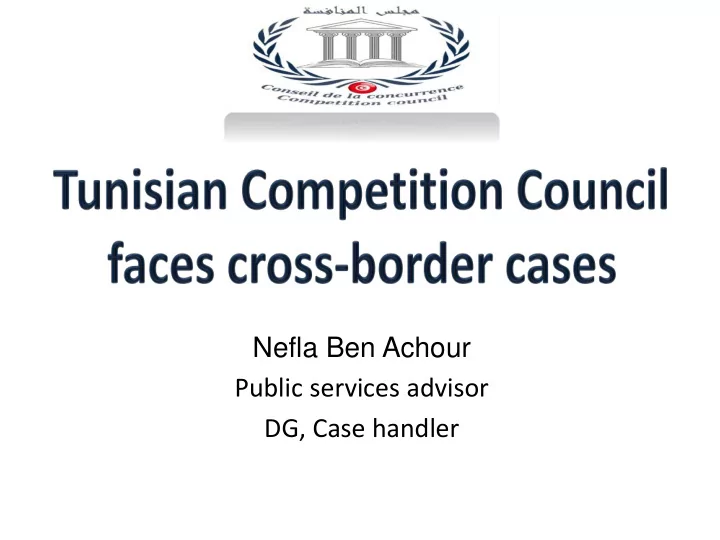

Nefla Ben Achour Public services advisor DG, Case handler
Tunisian Competition Council Jurisdictional & consultative authority. Created as a commission in 1991 & transformed on Council in 1995. Competent: to advise Government on matters relating to the economic market, to examine mergers and exemptions, to decide on anti-competitive practices such as illegal cartels, abuse of dominance, unilateral conduct, etc.
In respect of the principle of reciprocity and within the framework of cooperation agreements, the competition council may, within the limits of its powers and after notification to the ministry of trade, exchange with its foreign counterparts, experiences, information and documents relating to the investigation of competition cases, provided that the information exchanged is kept confidential. Art. 76 law n ° 2015-36
Tunisian Competition Council is active in : international networks: ICN, UNCTAD, OECD, etc. Regional networks: AFC, EMFC, CCC A regional center for training in competition for the UNCTAD-MENA countries was inaugurated in Tunis in 2016
The most important role of the regional competition regimes is to enforce cross border competition within their jurisdictions through: • Initiating and enhancing cooperation among Member States; • Assisting in adoption and harmonization of competition laws; assist in establishment and strengthening of domestic competition regimes; • Providing technical assistance through consultations and expertise; and enhancing detection and investigation of anti-competitive conduct.
The end result is an enhanced the regional integration, the trade liberalization and the economic development within the regional market. Consumers also benefit through increased consumer protection against the effect of anti- competitive conduct in the market.
Regional competition regimes present a number of opportunities and challenges. We will focus on the COMESA Competition Commission (CCC)
How to enhance cooperation between the regional and domestic competition regimes?
The announcement of Tunisia's accession in The Comesa (Common Market for Eastern and Southern Africa) was made in 2017. It entered into force on July 18, 2019, and formalized by the ratification of the agreement by the ARP (Assembly of People’s Representatives) on March 27 2019.
The Common Market for Eastern and Southern Africa (COMESA) was created in December 1994 to replace the former Preferential Trade Area (PTA) from the early 1980s in Eastern and Southern Africa. Is a free trade area with twenty-one member states. was created to serve as an organization of free independent sovereign States that have agreed to cooperate in developing their natural and human resources for the good of all their citizens. In this context, the main focus of COMESA has been on the formation of a large economic and trading unit to overcome trade barriers faced by individual States.
COMESA has established a number of institutions to support the private sector. These include: • The Trade and Development Bank for Eastern and Southern Africa (PTA- Bank); • The COMESA Clearing House; • The COMESA Leather and Leather products Institute (LLPI); • The COMESA Re-Insurance Company (ZEP Re); • The COMESA Monetary Institute (CMI); • The African Trade Insurance Agency (ATI); • The COMESA Competition Commission (CCC); • The COMESA Regional Investment Agency (RIA); • The COMESA Business Council (CBC) • The Alliance for Commodity Trade for Eastern and Southern Africa (ACTESA); • The Federation of National Associations of Women in Business.
The COMESA Competition Commission is an international organization established in 2003 by COMESA Competition Regulations (which were issued in the COMESA Official Gazette Vol. 9 No.2 as Decision No. 43 of Notice No 2 of 2004). To regulate competition in the common market. To promote and encourage competition by preventing restrictive business practices and other restrictions that deter the efficient operation of markets, thereby enhancing the welfare of the consumers in the Common Market, and protecting consumers against offensive conduct by market actors.
Procedures followed by some countries to deal with regional cross-border cases some countries such Egypt & Madagascar signed with the CCC a cooperation framework agreement for the implementation of competition rules and capacity building. To close cooperation, in particular concerning notifications, exchange of information, coordination of actions and encouragement of exchange and consultation between State Members.
Tunisia's priorities for handling cross- border cases relating to the COMESA Region a cooperation framework agreement allowing the coordination, harmonization and implementation of legal texts is the first priority to ensure active cooperation between the two parties, it is necessary to provide: a real and continuous technical assistance and capacity building, a reliable exchange of information and expertise a good coordination in activities such as investigations, execution and follow up decisions, etc.
Suggestions for improving TCC's current performance Revise the organization chart and create new units for: cooperation, communication, and providing them with the necessary human and logistic resources prepare a clear cooperation strategy for the short, medium and long term set target groupings and themes priorities
References • http://www.cct.gov.tn • https://www.uneca.org • https://www.comesacompetition.org • https://africanantitrust.com
nefla.benachour@cct.gov.tn www.cct.gov.tn
Recommend
More recommend